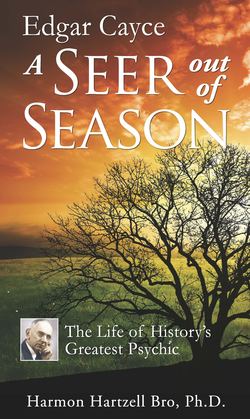Читать книгу Edgar Cayce A Seer Out of Season - Harmon Hartzell Bro - Страница 18
На сайте Литреса книга снята с продажи.
How Much Does He See?
ОглавлениеDuring most of the conversation the topics we addressed absorbed me. But now and then I noticed a second train of thought in the back of my mind. What was Cayce seeing in us? Did he judge us adequate for the roles he had planned? His biography had noted that he could see auras, or patterns of color around people’s heads and bodies, and could evaluate character and conflicts from them, as well as directly read minds. There was no hint that he might be using second sight to amplify or change his surface perceptions—no squints or faltering exchanges to suggest he was consulting an inward vision. Still, the thought of being inspected in the recesses of one’s psyche was uncomfortable.
Would he pick up my systematic doubt, as part of my determination to use my academic training in objectivity? I would be showing an affable side to him, as I did in my teaching or weekend church work. But another side would be watching closely for clues that might show him misguided or self-deceived, or exaggerating his capacities. Would he notice my suspicion that he might be self-important, pushed by a sense of divine mission? Surely someone conducting an incredible activity in a skeptical world, and able to think the unthinkable in concepts of reincarnation, would have considerable self-assertion in his makeup. I owed it to him, and certainly to the larger university and church worlds, to expose any messianism I found. And of course, if he turned out to be greedy or flawed in character, commercializing his ability, I would have to expose that, too.
Yet deeper than these concerns, which had to irritate him if he read my mind, was another layer in my thoughts: fears about my own adequacy. Would he pick up trends in my personality which I either did not recognize or preferred not to think about? He might see in my so-called aura a band of red for a strong temper. Or perhaps there were flashes of color for sexuality, not exactly erased by my recent marriage to a curvaceous blonde of Norwegian descent, whom I had courted with fervor for several years. He might even conclude that my activist resistance to arbitrary authority was colored by personal rebelliousness. Worse, he might find that my attempts to be objective about his capacities were partly intellectual arrogance, meant to balance off great uncertainty about my own spiritual maturity. I had not done much business with God outside of moments in choral music or in nature, though I had preached about him at some length. Cayce might find me tone-deaf to the inner notes of his work.
As we talked on, I felt a bit less vulnerable. It occurred to me that Cayce’s reported intuition should often have shown him in others the kind of momentary hesitation and fear which shadowed my thoughts (as I later found they had June’s). He must by now know well that people with varying needs to prove themselves would approach him with masked doubts and even strategies to unveil his delusions or flaws. Part of his strange vocation would be having to live with currents of unpleasant suspicion. He would also have learned to reassure others who approached him that he would not suddenly expose whatever he saw in them that was unworthy. His calling, if authentic, was not enviable. He had to be lonely at some level. Perhaps those who got to know him dropped not only their doubts, but their secret ambitions to use him. If they did not, or could not, then here was a man who could safely wrap around himself only his household. That limitation would be costly to his sense of identity and worth, already upended by the peculiarity of his gift.
The sense of his being stranded without peers or deep support outside the family would return often in the months ahead, when he seemed increasingly someone whose ability might have been welcomed in another time or culture, but a figure out of season in modern America. The implications were serious. If others who sought to duplicate his skills had also to stand awkwardly alone, even among well-meaning friends, who would try? What sort of person could meet the test of unending estrangement, created not only by doubt of unfamiliar capacities, but also by sudden fear of his or her penetrating accuracy?
